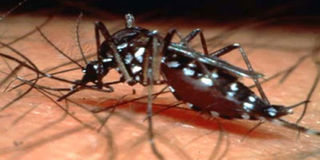Scientists: Dengue fever vaccine trials promising

What you need to know:
Prof Wilder-Smith believes that a single dose of a vaccine would reduce inconvenience and costly immunisation schedules.
London. Results of the first ever dengue vaccine clinical trials to have got to Phase-3 were published yesterday in the world’s most reputed science journal, The Lancet.
Researchers say the vaccine candidate, dubbed CYD-TDV and sponsored by French firm Sanofi Pasteur, has demonstrated moderate protection against the disease--at 56 percent--in Asian children.
The clinical trials show the vaccine can produce the desired effect--at 88.5 per cent after three doses--against severe forms of Dengue Haemorrhagic Shock (DHS), which causes hospitalisation in over half a million people--mostly children--every year.
Asian children aged two to 14 received three doses of the vaccine at six and 12 months and were followed up for two years.
The latest development will be received with joy by the majority of Tanzanians as the fever has already claimed five lives here in recent months and put public health experts on high alert.
The company reported last month that it was on the brink of developing a vaccine and went on to suggest that it might be ready by the end of next year.
But minister for Health Seif Rashid says that, the promising development notwithstanding, it is too early to celebrate as the vaccine is still subject to a long chain of tests before it is approved by The World Health Organisation.
There has been an element of surprise that the same effect could be achieved after the first dose, though, prompting a reaction from Prof Annelies Wilder-Smith of Singapore’s Nanyang Technological University, who said that further assessment could reveal even more important results.
Prof Wilder-Smith believes that a single dose of a vaccine would reduce inconvenience and costly immunisation schedules.
But she cautions that the question as to whether sufficient efficacy can be achieved with a lower number of doses deserves further assessment.
Writing a commentary on the vaccine, the professor appealed for continued support in developing other strategies, including a definitive cure, improved case management and new approaches of vector control because “with 56 per cent efficacy, the vaccine will not be a single solution”.




